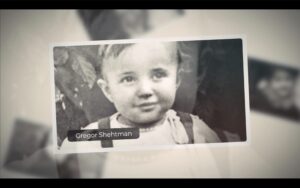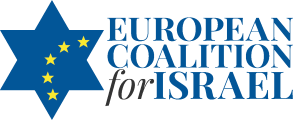 Helsinki, January 28th, 2021 – Christian leaders from around the world spoke out on the importance of Holocaust remembrance and education at a virtual Holocaust Memorial hosted by the European and International Coalition for Israel (ECI and ICI) on Wednesday evening in Helsinki, Finland. In a recorded message to the event, EU Coordinator on combatting antisemitism and fostering Jewish life, Katharina von Schnurbein, applauded the ECI/ICI-initiative to call on church leaders worldwide to adopt and implement the IHRA working definition of antisemitism.
Helsinki, January 28th, 2021 – Christian leaders from around the world spoke out on the importance of Holocaust remembrance and education at a virtual Holocaust Memorial hosted by the European and International Coalition for Israel (ECI and ICI) on Wednesday evening in Helsinki, Finland. In a recorded message to the event, EU Coordinator on combatting antisemitism and fostering Jewish life, Katharina von Schnurbein, applauded the ECI/ICI-initiative to call on church leaders worldwide to adopt and implement the IHRA working definition of antisemitism.
“We cannot fight that which we cannot define”, she said in explaining the need for a clear working definition of antisemitism. Two weeks ago the European Commission issued a special handbook on the IHRA working definition which has been made available for anyone who is considering adopting the definition.
In a special message to the Holocaust remembrance event, the Bishop of Helsinki, Teemu Laajasalo stated that the Evangelical-Lutheran Church of Finland denounces antisemitism in all its forms as defined by the IHRA definition. Leading up to the International Holocaust Remembrance Day this year, a number of other churches around the world have shown their commitment to the fight against antisemitism by endorsing the IHRA working definition. Among these churches are the Evangelical Free Church, Andreaskyrkan in Helsinki, Finland, Destiny Church in Glasgow, Scotland, and His Church in Durban, South Africa. Each of these churches has its own unique history in relation to the Jewish people.
In the case of the Andreaskyrkan in Helsinki, in which the Holocaust remembrance event took place, the relationship dates back to the early 1900´s when the church founded the Jewish solidarity association “The Friends of Israel” in order to care for Jews living in Helsinki at the time. During the Second World War, the association helped protect local Jews while German troops were in the country. In Glasgow, the importance of standing with the Jewish people is a recent discovery for Pastor Andrew Owen, who has befriended Jewish leaders in his city and is in the process of learning more about the State of Israel. In Durban, South Africa, His Church decided to adopt the IHRA definition of antisemitism as an expression of solidarity with the Jewish people, in the very same city which in 2001 hosted the infamous UN World Conference against Racism which turned out to be a hate-fest against the Jews. The conference has given the city a bad name in many Jewish circles, but by adopting the IHRA definition Pastor Simon Hemsley affirms that the church in Durban stands with the Jewish people.
With the launch of the campaign “Churches Against Antisemitism – I am my brother’s keeper”, ECI and ICI are inviting churches worldwide to adopt the IHRA definition of antisemitism, creating a support network in which churches will be able to share resources and, when necessary, raise their voices against Jew hatred.
“Seventy-nine years ago, when Hitler declared his ‘final solution’ at the Wannsee Conference in Germany, there was no such network of churches in Europe”, said ECI Founding Director Tomas Sandell, who moderated the Holocaust Memorial on Wednesday night. “Today we want to make sure that we are properly equipped and organised to stand against the rise of Jew hatred”, he added. The network will operate under the new International Coalition for Israel (ICI) umbrella organisation in Geneva.
In a recorded message from Geneva, Bjorn-Ove Aronsson, Chair of the Free Evangelical Church in Geneva, committed to adopting the IHRA definition of antisemitism and called on other churches to do the same.
Also during the online Holocaust remembrance event, many Christian leaders, among them Former Archbishop of Canterbury, Lord Carey, Gordon Robertson of the Christian Broadcasting Network (CBN), and Arto Hämäläinen, Chair of the Pentecostal Commission on Religious Liberty, spoke about their own experience from having visited concentration camps, whereas Reverend Nicky Gumbel from Holy Trinity Brompton in London and the pioneer of the Alpha Course said that while many members of his family were murdered in the Nazi concentration camps, his own father managed to flee to the UK.
“It is important to take a stand against antisemitism in all its forms to ensure that what happened in the Nazi concentration camps is not repeated”, he said.
Whereas the Holocaust took place in Europe, antisemitism has today become a global threat and even in nations where there are no Jews, conspiracy theories blaming the Jews for the corona pandemic are widespread. The ICI network is therefore open to support churches in all corners of the world. Senior Pastor Yang Tuck Yoong from the Cornerstone Community Church in Singapore noted that we are living in the most divided time in history as the spirit of antisemitism is rising up in many nations.
“The church has a responsibility to speak up against this evil. The church has a responsibility to stand strongly with the Jewish community”, he said.
In his keynote speech, ECI Director for UN Affairs Gregory Lafitte explained that the root of Christian antisemitism can be found in the story of Cain and Abel. He cited a quote attributed to Pope John XXIII in saying: “Today we realise that for very many centuries our eyes were blinded and that we can no longer see the beauty of Your people: that they are chosen, that we recognise on their faces the features of our privileged brothers. We realise that the sign of Cain is engraved on our foreheads. For centuries, our brother Abel lay in the blood and tears that we caused him to shed, for we had forgotten your love. Forgive us for having wrongly attached a curse to their name as Jews. Forgive us for having once again crucified you in their flesh. For we knew not what we were doing.”
The Holocaust remembrance week will conclude on Sunday, January 31st, when ICI will host a webinar on the rise of antisemitism and the response from the church today. Among the panellists and contributors are author and social critic Os Guinness, Pastor Markus Österlund from Helsinki and Mark Rodgers from Washington D.C. The discussion will be moderated by Tomas Sandell and Gregory Lafitte.
